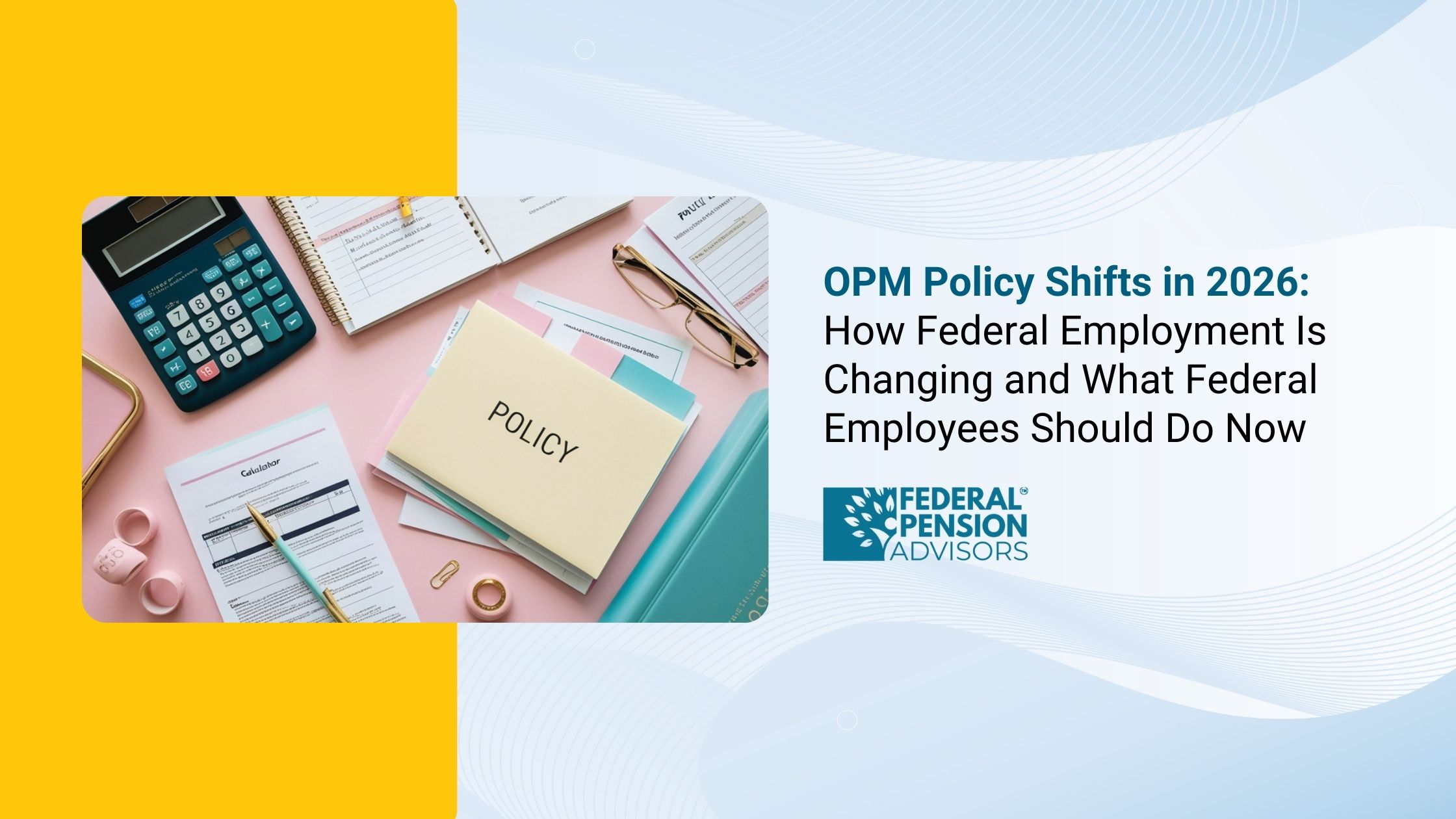You’re not alone; 4,359 federal employees booked their free review.

Federal Employee Benefit Cuts: Where Things Stand in 2025
No Federal Employee Benefit Cuts in Senate-Passed H.R. 1
Federal employees can breathe a sigh of relief. Despite months of concern, the Senate-passed version of H.R. 1 does not include any federal benefit cuts that would impact current employees or retirees. Proposals to cut pensions, increase FERS contributions, or restructure FEHB have been stripped from the final bill.
This update follows growing anxiety across the federal workforce about changes to retirement income and job security. Here's everything you need to know about where the bill stands, what was proposed, and what got removed plus what it could mean for the future.
Senate Removes All Federal Workforce Provisions from H.R. 1
On July 1, 2025, the Senate passed H.R. 1 in a 50-50 tie vote, broken by Vice President J.D. Vance. Earlier versions of the bill included a series of cuts and policy changes aimed at federal employee benefits but these did not make it into the final Senate version.
Original House Proposals: What Cuts Were on the Table
The original Committee Print draft included sweeping proposals that would have reduced federal employee benefits significantly:
- Elimination of the FERS Annuity Supplement (with narrow early retirement exemptions)
- Change in pension calculation from "high-3" to "high-5" salary average
- Increase in FERS employee contributions to 4.4% a pay cut for most workers
- Mandated choice between at-will employment or increased pension contributions
- MSPB appeal fees for federal employees
- Proposed restructuring of FEHB into a voucher-based system (though dropped early on)
House Amendments: Some Relief Before Senate Negotiations
When the bill reached the House Rules Committee, several provisions were softened in response to pushback:
- FERS contribution increases were removed
- Pension calculation changes were reversed
- Early retirees exempted from at-will employment conditions
- FERS Annuity Supplement elimination delayed until January 1, 2028
The amended version of the bill passed the House by a tight margin on May 22, setting up Senate negotiations that ultimately removed the federal benefit cuts altogether.
Federal Retirement Safe For Now. But Will It Last?
The Senate just removed benefit cuts from H.R. 1 a big win for federal employees.
But the fight isn't over. Future proposals could still threaten your pension, annuity supplement, or FEHB coverage.
Don’t leave your retirement to chance.
At Federal Pension Advisors, we help federal employees:
- Understand complex retirement rules and COLA updates
- Prepare for early retirement without costly mistakes
- Navigate threats to FERS, CSRS, and survivor benefits
- Optimize your pension, TSP, and health coverage strategy
Senate Version by Rand Paul: What Stayed, What Was Dropped
Sen. Rand Paul’s draft of the bill retained some targeted provisions but notably excluded cuts for current federal employees and retirees.
Proposals that remained included:
- Higher FERS contributions for future federal hires
- Mandatory choice between at-will employment or increased pension contributions
- New fees for MSPB appeals
- A 10% surcharge on payroll-deducted union dues
- Presidential authority for agency restructuring
- Audit incentives for FEHB participation
However, most of these failed to meet Senate budget reconciliation rules and were stripped before final passage.
Final Outcome: No Cuts in the Approved Senate Bill
The final manager’s amendment, introduced on June 27, removed all the controversial provisions. The Senate-passed version of H.R. 1 does not cut any federal benefits a major shift from what was originally proposed.
This includes:
- No changes to FERS retirement formulas
- No increase in employee contribution rates
- No structural overhaul of the FEHB programme
- No shift to at-will status requirements
- No reduction in COLAs or annuity supplements
What Federal Employees Should Know Now
Where Things Stand
- No federal benefit cuts are currently moving forward under H.R. 1
- Retirement plans, FEHB, and employee protections remain unchanged for now
What to Watch
- Future budget bills may target new hires or reintroduce contribution hikes
- Continued pressure on reducing long-term federal spending could revive old proposals
Conclusion: A Win But Stay Vigilant
For now, federal employee benefits are safe, thanks to intense advocacy and Senate negotiations. But this legislative battle highlights how quickly things can shift. Federal workers, retirees, and future hires should stay engaged, informed, and ready to respond to any future proposals involving federal employee benefit cuts.
Federal Employee Retirement & Layoff FAQs
Can I retire at 57 with 20 years of federal service?
Yes, if you are under the Federal Employees Retirement System (FERS) and meet the Minimum Retirement Age (MRA) with at least 10 years of service, you can retire under MRA+10 rules.
However, with 20 years at age 57, you may also be eligible for Voluntary Early Retirement (VERA) if your agency is offering it.
Keep in mind:
- Your pension may be reduced if you retire under MRA+10 before age 62, unless you qualify for a deferred or postponed retirement.
- You can avoid reductions by postponing the start of your pension until age 60 (if you have at least 20 years).
Why are federal employees being laid off?
Federal layoffs are rare, but when they do happen, they are typically tied to:
- Agency budget cuts or restructuring
- Program eliminations or automation
- Shifting political priorities
- Reduction in Force (RIF) due to downsizing
Federal employees affected by RIFs are generally entitled to priority placement programs, severance pay, and sometimes early retirement options (VERA).
What is the 2026 federal pension COLA?
The official 2026 Cost-of-Living Adjustment (COLA) for federal retirees will be announced in October 2025, based on the Consumer Price Index for Urban Wage Earners and Clerical Workers (CPI-W).
However, early projections suggest it could be in the 2.0% to 2.5% range, depending on inflation trends.
- FERS retirees receive a reduced COLA if inflation is above 2%.
Example: If COLA is 3%, FERS retirees receive only 2.0% (not full COLA). - CSRS retirees receive the full COLA.
Stay tuned to OPM announcements for the final percentage.
Can your federal pension be reduced?
Yes, your federal pension can be reduced under certain conditions:
- Early Retirement Reductions
Retiring before your full eligibility age (typically age 60 or 62) may result in a 5% reduction per year under MRA+10. - FERS COLA Adjustments
FERS retirees do not receive the full COLA if inflation exceeds 2%. - Court-Ordered Reductions
Your pension can be partially awarded to a former spouse due to divorce settlements. - Back-to-Work Offsets
If you return to federal service as a reemployed annuitant, your pension may be temporarily offset by your salary.
However, your earned pension cannot be arbitrarily cut or removed, and reductions are usually based on retirement timing or legal rulings.


Get Updated
Subscribe to our weekly updates for the latest on retirement planning, federal benefits, exclusive webinars, and more!
Download Federal Retirement: Step-by-step Checklist
This comprehensive guide will help you understand your federal benefits, optimize your savings, and plan for a comfortable future.



.png)








